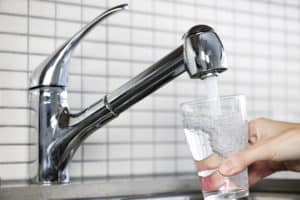We like to share product recommendations with you and hope you like them! Just to make you aware Water Filter Data may collect a small share of sales or other compensation from the links on this page.
Have you ever thought about the quality of the water you drink? Wondering how many times it has gone through a purification process, whether it’s maybe contaminated or not? It is a very reasonable concern, and you are not alone. Every person had at least once thought of the quality of water that they consume on daily basis. In order to ease your mind and help you decide, here’s a side-by-side comparison between well water vs city water.
Even though both have positives and negatives the challenge of choice remains.
City Water VS Well Water: What do I drink?
When we purchase a home the first thing that comes to mind is, “What size is my utility bill going to be?”
Most individuals are concerned about utility costs but rarely consider where their water actually comes from. Here are the questions that you should ask when determining whether or not your water is well contaminated.
Do I pay the water bill?
All water is not created equal. Some of it is fully treated to ensure safety, while other types are raw, dirty, and can be heavily contaminated. Before making the switch from city water to well water, assess the cost differences and learn about the pros and cons of each type.
Is there a water pump near my home?
If yes, that is a clear indicator that you use well water. Well-water must be seldom pumped.
Well-water is untreated groundwater. Well-drillers drill down to the aquifer, which is an underground layer of permeable rock containing water. That is where you use the pump.
Well, water is essentially rain that has moved through the soil and into an aquifer. Where does that leave city water?
City water comes from local rivers, lakes, and streams—in other words, from surface reservoirs.
City Water VS Well Water: Well water
 Because water is an incredible solvent, groundwater will dissolve organic matter, including minerals found in the soil and rocks beneath the Earth’s surface.
Because water is an incredible solvent, groundwater will dissolve organic matter, including minerals found in the soil and rocks beneath the Earth’s surface.
The minerals like calcium and magnesium are what make the water harder.
Unless you live in a region where there are naturally fewer of these minerals, a home with a private well will likely require a water softener.
If you’re building a home in the country yard without access to municipal water, a softening system should be installed.
Keep in mind, the equipment may need to be updated to efficiently and effectively treat your well water.
Here are a few advantages of having well water:
Having a private well cancels your monthly water bill. It’s making it easy on your budget.
On the other hand, if you are using a septic system, then you are not going to get a monthly sewer use bill.
Having fewer bills is normally a good thing, don’t you agree?
Of course, well-water is fresher, high in nutrients, and rich in minerals. Because well water is coming from the aquifer underground, instead of run-off or surface water, it seems to be cleaner and fresher.
Groundwater is also high in healthy nutrients and minerals that are great for the body, including your children. Also, well water high in minerals often tastes better.
Another good thing is that well water is usually protected from contamination during a natural disaster. Natural disasters, like floods, tend to disrupt a city’s ability to distribute healthy water to homes.
Well-water is typically immune from this problem unless the disaster is particularly bad and widespread.
The disadvantages:
Well-water is dependent on electricity and needs to be pumped out of the ground. If the electricity goes out, then your pump will stop working.
That will leave your household without water. You will want to make sure that you have an alternative source of electricity like a generator or solar panels.
Taking care of the quality and quantity of your water will be your responsibility. If your well runs dry it isn’t the city’s problem.
Because the well is on your property, you are responsible for any maintenance, repairs, or additional drilling needed.
Depending on the repair, it can be quite costly. You are also responsible for the quality of your well water. It is up to you to have your water regularly tested to verify that it is safe to use.
Well-water can become contaminated and toxic to drink. Chemicals, radiation, sewage, and dead animals are all potential pollutants that can contaminate well water.
Running off from farms, septic systems, nuclear power plants and a dead animal falling into your water source impacts the quality of the water in your well.
Sources of nutrient pollution are fertilizer, animal manure, sewage treatment plant discharge, detergents, stormwater runoff, cars, and power plants, failing septic tanks, and even pet waste.
If you do notice a change in water quality, (appearance, odor, taste, etc.) it’s a good idea to have your well tested, even if it hasn’t been a year since the last test.
There are at-home, out-of-the-box tests you can purchase and perform yourself. When you go this route, it is important to read what exactly the kit is testing for – not all tests are created equal.
City Water VS Well Water: City Water
 If you have water coming in from the city, this is the more common option for people. The city gathers the water and filters it before sending it out to the homes of inhabitants.
If you have water coming in from the city, this is the more common option for people. The city gathers the water and filters it before sending it out to the homes of inhabitants.
After the water is treated right, it will sit in a reservoir and reach your place through underground pipes, for us known as water mains.
From the water main, the pipe that fetches the water to bring it into your home is called a service lateral line.
Just as well water has pros and cons, so does city water.
Pros about having city water:
People working in the municipality are responsible for the quality and quantity of water.
When you turn on your tap, you don’t have to worry about the last time it was tested. You can rest assured that it is continually being tested by the city.
Many people prefer city water for this reason: It is one less thing to manage and take care of. The city is responsible for getting safe water to your home. In addition to making sure the water is safe, the city also adds healthy nutrients and minerals to the water to safeguard the health of the public.
If you are ever concerned about the quality of your water, you can always ask the city to test your water. Also, the city is responsible for providing yearly reports on water being provided to homes.
City water is available in most places. Unless you move to a rural area, there is a high chance that city water has been connected to your home.
To access that water, you only need to ask the city to turn it on.
Mortgage lenders prefer city water. Because well water can be unpredictable, and city water is more regulated, mortgage lenders offer better rates to homeowners with city water.
Cons about having city water are:
City water is far less fresh than well water. City water is collected from run-off and surface water. That means it has come into contact with more pollutants and chemicals than the water sitting underground.
Also, because city water has been put through extensive filtering and chemical treatment, it might not taste as refreshing as well water.
One of the biggest cons is that city water can be expensive. Nationally, cities have been raising water bills. As water becomes more polluted it has become harder to treat.
While it is very convenient to have water managed by someone else, it is also beginning to be a very inconvenient bill.
Those who own a home should start thinking about the future of water in their city and realize that it is a very important resource that is under threat. Clean water is worth every penny because we can’t live without water.
City water can be turned off by someone else.
Because the city manages the water, they can turn it off. If you can’t pay, the city can turn off your water. If the city needs to unexpectedly treat the water, they may turn it off without warning.
Turning off your water supply for treatment is a rare occurrence, but still, it is something that you don’t have any control over.
City water can become contaminated on a large scale. Natural disasters, like floods, can cause large-scale contamination of the city’s water supply. Because the water, pipes, and equipment need to be treated it can take a long time before the water is safe to use.
Boil water advisories should always be followed for as long as they are posted.
Well-Water VS City Water: Which Is Preferable?
The comparison of city water and well-water provides a better understanding of the two kinds of water. City water is quite stable in quality. It will not fluctuate in its composition whether the seasons are changing or other weather patterns occur.
For example, the temperature of the water in a city might increase, but this type of change does not substantially affect the taste or health quality.
Most people will choose the well water over city water for many reasons. Well-water comes with some health benefits that cannot be found in city water. As we already said, the cost of operating well water is much lower than the monthly bills paid for city water.
Although the two types of water have very little difference in terms of taste, well water is safer to drink than city water. The reason being, well water is not subjected to contamination and contaminants in the same way as city water is.
Those who live in areas that are not under municipal water supply, usually opt to depend on well water as their drinking water source.
This is because these sources contain natural minerals that can greatly improve the flavor and quality of the water. However, do you know that not all wells are clean and drinkable?
How to Treat Well Water
The first step is to test your well for common contaminants. We suggest that you may do many types of certified laboratory water tests that test for common well-contaminants like coliform bacteria, tannins, manganese, and nitrates.
Based on your test results you can pursue the proper treatment protocol and outfit your home with specialized water filtration systems. With a water filtration system, you can remedy common well-problems including nitrate contamination, rotten egg smell, recurring stomach issues, and dissolved minerals.
How to Treat City Water
Filtering your water is an easy and affordable way to get around the chemicals in your drinking water. If you’re ready to start drinking healthier, unfiltered city water, this post will tell you everything you need to know about getting started with a filter and provide a few different filter options.
Other common problems in city water include water hardness and contamination from heavy metals like lead that can leach into your drinking water while it travels through aging pipes.
The best approach to treating city water is to install a water filter and water softener. By filtering common contaminants like chlorine and heavy metals while preventing hard water issues like scaling you can enjoy the benefits of city water without experiencing the drawbacks.
Well-Water VS City Water: Conclusion
A smart move is to ask yourself if the responsibility of maintaining a private well is best for you. If the annual maintenance and possible water issues like contamination are not an issue for you, well water is the way to go.
But if your city water has no known contamination and you don’t have the time to maintain a well, city water may be better for you. Always be aware of inclusions and exclusions on your home insurance policy.
That way, if something happens and it’s not your fault, your insurance will cover well pump replacement.

Wayne is a water quality expert – The founder of Water Filter Data. He has a degree in microbiology and his field of expertise is drinking water. His goal is to allow for clean and healthy water for as many people as possible.



